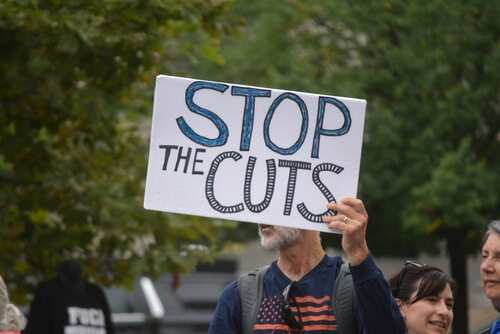Senate Democrats are sounding the alarm over President Trump’s new D.C. security push, calling it a “power grab” as Republicans rally behind a dramatic federal law enforcement surge and the largest funding overhaul in years.
Story Highlights
- Trump administration slashes D.C. security funding by 44%, the largest cut in recent history
- White House plans a new D.C. Security Fund package to increase federal control over local law enforcement
- Senate Democrats decry the move as an attack on local autonomy, while Republicans support Trump’s law-and-order agenda
- Federal-local power struggle intensifies as public safety and self-governance hang in the balance
Trump’s Federal Law-and-Order Surge Faces Fierce Partisan Clash
President Donald Trump’s administration has ignited a high-stakes battle on Capitol Hill after launching the “Making D.C. Safe and Beautiful” Task Force in March 2025. This move sent a surge of federal law enforcement into Washington, D.C., marking a direct presidential intervention in local policing. By August, the administration announced a 44% cut to D.C.’s urban security funding, reducing support to $25.2 million—the steepest drop for any major U.S. city this year. Senate Republicans are preparing for a White House proposal to create a new D.C. Security Fund, designed to further centralize control and resources at the federal level.
Senate Democrats have responded with sharp criticism, framing Trump’s efforts as a blatant attempt to consolidate power and undermine the District’s home rule. They warn that this level of federal intervention threatens not only local governance but also the constitutional balance between states, localities, and the federal government. The debate is not merely rhetorical: the funding cuts and new enforcement initiatives hit at the heart of D.C.’s ability to manage its own public safety, while the White House insists these steps are necessary to restore order after years of what it calls “failed local leadership.”
Deepening the Divide: Autonomy Versus Security
The controversy over the D.C. Security Fund exposes long-standing tensions over the status of Washington, D.C., as a federal district with limited self-rule. Historically, Republicans have voiced skepticism about expanding D.C. autonomy, pointing to persistent concerns over crime rates and the effectiveness of local government. Democrats, on the other hand, have pushed for greater home rule and even statehood. Trump’s direct involvement, through both executive orders and public statements vowing to “take over the horribly run capital,” has brought these issues to the forefront, with both sides claiming the mantle of constitutional principle and public safety.
For Trump and his Republican allies, the new approach is about restoring order and projecting strength in the nation’s capital—setting an example for urban policy nationwide. The creation of the multi-agency task force, involving federal agencies like FEMA, the FBI, and the DEA, represents an unprecedented assertion of executive authority in local law enforcement affairs. Supporters argue this is a necessary response to surging crime and previous years of what they see as permissive, ineffective policies. Critics counter that it sets a dangerous precedent for federal overreach and could erode the checks and balances that protect democratic governance at the local level.
Implications for Urban Policy and Conservative Values
The funding overhaul and law enforcement surge carry significant short- and long-term implications. In the immediate term, D.C.’s police and public safety infrastructure will face resource constraints as federal funds are slashed, even as federal agents take a more visible role on city streets. This shift may strain local-federal relations and introduce confusion in the chain of command, affecting both community trust and operational effectiveness. Over the long haul, the precedent of expanding federal intervention in urban security could spread to other major cities, potentially reshaping the nation’s approach to local governance and public safety.
For conservatives who value law and order, limited government, and constitutional protections, the stakes are clear. The Trump administration’s approach is framed as a necessary correction to years of leftist mismanagement and a defense against rising crime and government dysfunction. Yet the fierce Democratic opposition, legal challenges, and warnings from policy experts highlight the complexity of balancing federal power with local autonomy. As the proposed D.C. Security Fund heads to Congress, the coming weeks will determine whether Trump’s vision for the capital becomes a national template—or a flashpoint for ongoing constitutional debate.
Capitol Hill prepares for high-stakes battle over Trump crime package, DC police authority https://t.co/wdYdlkzyff #FoxNews
— SANDALIO CARMONA (@SANDALIOCARMONA) August 15, 2025
With public debate intensifying, D.C. residents, local officials, and national leaders find themselves at a crossroads. The outcome of this struggle will reverberate far beyond the capital, influencing future battles over public safety, federalism, and the very nature of American self-government. As the Senate prepares to take up the security fund package, all eyes remain fixed on whether law-and-order priorities or local control will prevail in Washington, D.C.
Sources:
WTOP: Trump administration slashes D.C.’s security funding by 44%
White House: President Donald J. Trump Restores Law and Order in the District of Columbia
Fox News: Capitol Hill prepares for high-stakes battle over Trump crime package, DC police authority
Click this link for the original source of this article.
Author: Editor
This content is courtesy of, and owned and copyrighted by, https://libertynewsalerts.com and its author. This content is made available by use of the public RSS feed offered by the host site and is used for educational purposes only. If you are the author or represent the host site and would like this content removed now and in the future, please contact USSANews.com using the email address in the Contact page found in the website menu.








